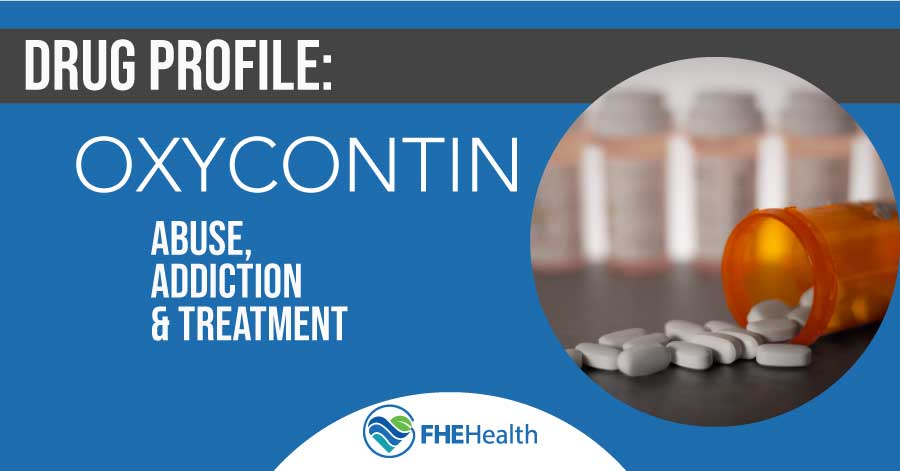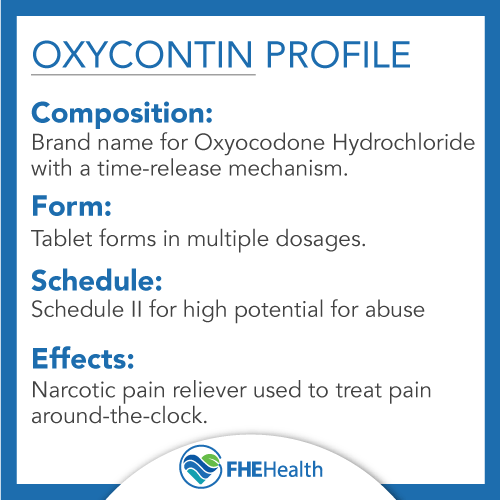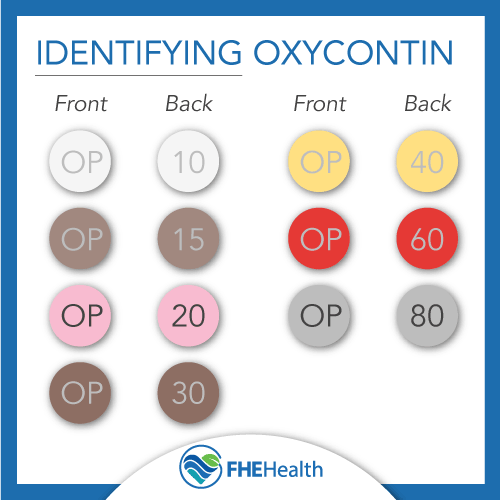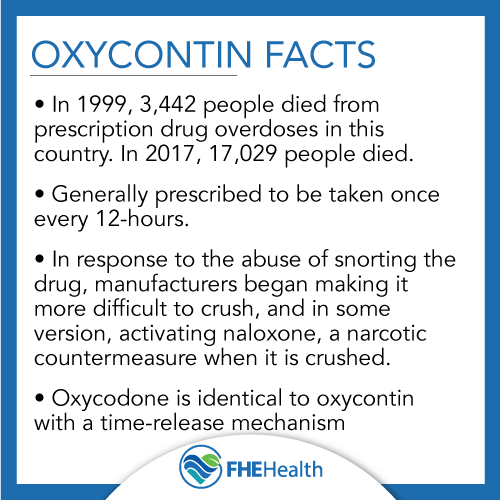
“OxyContin” is a type of painkiller that may be prescribed for the treatment of acute pain as well as some forms of chronic pain. OxyContin is the brand name for the drug “oxycodone hydrochloride.” It’s sometimes referred to as “oxycodone OxyContin” as a result. The drug is an opioid and a narcotic, which means it can be addictive— especially when used for a longer period of time or misused.
“Oxy,” as it is sometimes referred to in the mainstream media, is in fact highly addictive, even when taken as prescribed. The drug may have gained greater notoriety as a result of being implicated in the overdose deaths of celebrities Heath Ledger and Michael Jackson, but thousands of Americans die each year on account of Oxycontin and other prescription painkillers. In 1999, 3,442 people died from prescription drug overdoses in this country. In 2017, 17,029 people died, according to the National Institute on Drug Abuse.
Identifying OxyContin
 OxyContin is a controlled-release drug comprised of oxycodone hydrochloride. Numerous slang terms exist for it including “Oxycet,” “O.C.,” “Percs,” “Hillbilly Heroin,” and “Oxycotton.” All describe a pain medication typically prescribed by a doctor. Some people sell these drugs illegally as well.
OxyContin is a controlled-release drug comprised of oxycodone hydrochloride. Numerous slang terms exist for it including “Oxycet,” “O.C.,” “Percs,” “Hillbilly Heroin,” and “Oxycotton.” All describe a pain medication typically prescribed by a doctor. Some people sell these drugs illegally as well.
OxyContin prescribed by a doctor is a type of sustained-release product. OxyContin extended-release formulas are tablets designed to release a small amount of the drug into the body over a longer period of time. Usually taken one time every 12 hours, the extended-release version of Oxycontin can relieve pain for a longer period without as much of the drug.
Injecting OxyContin
Misuse of Oxycontin is common: one frequent form of abuse is to crush older versions of the pill and then snort it or inject it; some people smoke it; others chew the tablets.
Not long ago, those addicted to OxyContin could get a faster high if they injected it. Recently, however, the drug’s manufacturers updated its formation to make it impossible to inject, making injection of Oxycontin difficult if not impossible. (The drug is available in tablet form in doses ranging from 10 mg up to 160 mg.) The new pills have “OP” stamped on one side and are very difficult, if not impossible, to crush. They also do not dissolve in water: if mixed with water, they form a thick gel impossible to add to a syringe.
Are oxycodone and Oxycontin the same thing?
This is a common question many people ask. The answer is yes— for the most part. OxyContin is a brand name for oxycodone. Both drugs have the same active ingredient, but OxyContin has a time-released mechanism. Oxycodone is a generic form of the drug without the extended release characteristic.
What Does OxyContin Do? How Do You Take OxyContin?
 Oxycodone, OxyContin, and other prescription opiate drugs like it work to control the brain’s pain signals. By changing the way the central nervous system works, they eliminate pain. Doctors prescribe this drug because it is highly effective. Most often, doctors prescribe it only for the relief of moderate to severe pain. Unlike other painkillers, the extended release feature helps to provide people who need it significant help for a longer period of time.
Oxycodone, OxyContin, and other prescription opiate drugs like it work to control the brain’s pain signals. By changing the way the central nervous system works, they eliminate pain. Doctors prescribe this drug because it is highly effective. Most often, doctors prescribe it only for the relief of moderate to severe pain. Unlike other painkillers, the extended release feature helps to provide people who need it significant help for a longer period of time.
As a street drug, Oxycontin can create a fast, euphoric, heroin-like high for its users. Some users remove the sustained-release outer coating on the pills in order to intensify that experience of euphoria. (OxyContin manufacturers designed the drug to slowly release over a period of 12 to 18 hours, but removal of the outer coating eliminates this feature.)
Oxycontin can linger in the system for 24 hours or longer, but the effects wear off within a few hours of taking the drug.
Addiction to OxyContin
As an opioid, OxyContin is a highly addictive substance. As noted, even taking the drug as prescribed by a doctor can lead to addiction, according to the U.S. Food and Drug Administration. Additionally, it is easy to overdose on.
If prescribed, individuals should always use the medication as directed. Do not take a higher dose than what has been prescribed. Stop taking it as soon as possible. Some people may wish to consider alternatives to OxyContin and opioids to avoid the risks of addiction and OxyContin overdose.
What Are the Dangers of Oxycontin Abuse?
 OxyContin abuse can create a chemical dependency. This occurs when the drug alters the normal communication between the brain and the rest of the central nervous system. Over time, it changes the makeup of the brain. When this happens, chemical dependency occurs. The body becomes dependent on the drug, requiring more of it to maintain the same pain-free condition.
OxyContin abuse can create a chemical dependency. This occurs when the drug alters the normal communication between the brain and the rest of the central nervous system. Over time, it changes the makeup of the brain. When this happens, chemical dependency occurs. The body becomes dependent on the drug, requiring more of it to maintain the same pain-free condition.
The following may be signs that you or a loved one is struggling with Oxycontin abuse:
- They take the medication even when they do not have pain.
- They “doctor shop,” visiting multiple doctors in order to gain access to more than one prescription of the pain medication.
- They consume more than what was prescribed.
- They experience painful withdrawal symptoms when not taking the drug.
- Responsibilities and quality of life are different; they seek out the drug on a constant basis.
- They need increased amounts of the drug, or need to take it more frequently, in order to get the same pain-relieving benefits.
If these signs pertain to your situation, get help immediately. Overdose is a very real danger.
Signs and Outcomes of Short-Term OxyContin Use
Signs of OxyContin abuse can be hard to notice at first. Many people develop a tolerance for the drug, requiring more of it to get the same effect. This can be an early warning sign of addiction. Common side effects for this drug include the following. These can occur on a first dose as well as on routine use.
- Stomach pain
- Flushing of the face
- Headaches
- Dry mouth
- Changes to mood
- Drowsiness
More severe side effects can also occur. When these occur, it is important for individuals to talk to their doctor about continued use:
- Irregular heartbeat or a fast heart rate
- Nausea and vomiting
- Inability to maintain an erection; decreased sex drive
- Chest pain
- Hives or a rash
- Swelling of the face and throat
- Trouble breathing
- Seizures
- Extensive fatigue
- Feeling lightheaded, especially when sitting up
It is important to note that an OxyContin overdose can occur upon first use without any warning signs. Consider speaking to your doctor about alternative forms of treatment for pain.
Signs and Outcomes of Long-Term OxyContin Use
Longer-term use of OxyContin is never ideal. The longer a person is using the drug, the more likely he or she is to develop a chemical dependency to it. Long-term use can create additional risk factors, including:
- Severe constipation
- Persistent vomiting
- Muscle spasms and lack of muscle control
- Reduced breathing rate
- Slowed heart rate; limiting oxygen to the body’s organs
- Infection and inflammation
- Seizures
- Sudden cardiac death
Treatment for OxyContin Addiction
OxyContin’s high addictive potential makes it hard to simply stop using. Anyone who has been prescribed the drug should avoid long-term use. This means reducing overall use as soon as medically possible. Once a chemical dependency has set in, treatment is almost always a necessary next step.
OxyContin addiction requires treatment that is customized to fit the severity of the patient’s needs. For those with severe addiction or with a history of long-term use, medically supervised detoxification in an inpatient setting may be necessary. In this safe, medically monitored environment, doctors can provide life-saving and pain-reducing treatments while the body works to flush the substance out.
Many people benefit from residential treatment as well as psychiatric treatment. Though it is not always necessary for people to be in a residential treatment center, intensive outpatient therapy may be necessary to help prevent relapse. Relapse rates for opioid users can range from 72 to 88 percent after 12 to 36 months, according to a study published in the U.S. National Library of Medicine. Following rehab, long-term therapy and continuing care can help reduce the risks of relapse and improve the prospects of lasting recovery.
FHE Health provides comprehensive drug addiction treatment for opioid addiction, including for OxyContin use. Contact our treatment centers to learn more about care options for you or your loved one.






